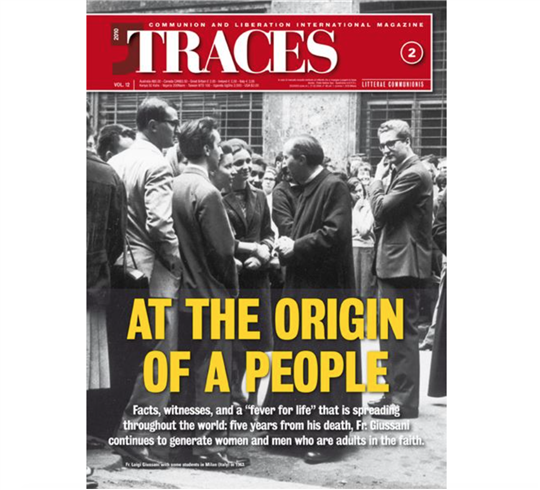
Traces N.2, February 2010
A New StoryFive years ago, Fr. Giussani died. At the conclusion of his funeral, celebrated by then-Cardinal Joseph Ratzinger, Fr. Julián Carrón, the successor, entrusted to the 40,000 people present the challenge he felt first of all for himself: “I am sure that if we are simple in following, we shall feel Fr. Giussani more than ever a father.” It was true. “More than ever a father” and, thus, more than ever alive. Now we can say it with even more certainty, because of what we have seen in these years and continue to see, right before our eyes.You can say what you want, you can think whatever you want about CL and its limits (and who doesn’t have them?) but you cannot deny that, in its way, the charism of Fr. Giussani mysteriously continues to face modernity’s challenge to the faith and renew it in the world: can Christianity generate a new creature now? Not “new ideas,” “new cultural drives,” “new rules of behavior” to cling to, but a new creature, a different humanity, a human experience that makes living and loving worthwhile. Is it possible, now?
Well, those who have encountered, and continue to encounter his children–witnesses like Fr. Giussani–can answer that question with a “yes,” and can say it before facts, something that happens. The fact may be the tenacious hope of certain volunteers on the front lines in Haiti, the proposal charged with reasons that surprised a group of New York intellectuals, or the scores of encounters and moments that happen in the most hidden places (a hospital room, a classroom, a family kitchen…). But these facts and events are changing the daily life of women and men. Now.
These examples are drawn from this month’s Traces, beginning with the letters. All these facts bear within their weft and woof a question: what makes them happen? The intelligence of the protagonists? Their “competence”? Their ability to overcome by themselves the wounds of their own weakness and incoherence? Impossible. Something else is needed. As Fr. Carrón said some time ago to CL university students, quoting Fr. Giussani, “There is a factor within, a factor that decides about this companionship, certain outcomes of this companionship [these gazes, this newness of relationships], certain resonances of this companionship, a factor so surprising that if I don’t affirm something else I don’t give reason to the experience.”
“Something else” is needed to explain the different humanity generated by Christianity. His Presence is needed–Jesus who happens, contemporaneous with us. And our “yes” is needed, our willingness to let ourselves be embraced in all our weakness and limitation. Simple, like an event, and dramatic, because like every real fact that happens now, it calls our freedom into action.
Fr. Giussani’s entire life was an example of this simplicity, dense and dramatic, and it was spent entirely, up to the very end, so that we–you and I–might fight the intense battle needed to reconquer this simplicity of heart, to shed our fear of our wounded humanity. This is the beginning of the feast of faith, as he wrote in Is It Possible to Live This Way?, that “makes the adult the leader of a new history, a craftsman, a protagonist of a new history in the world, which means to say the creator of a people, the generator of a people.”
We are in the world for this: to accept that we are generated and thus to generate a new history. The beautiful thing is that it happens. We are grateful to the Church and to Fr. Giussani for this.